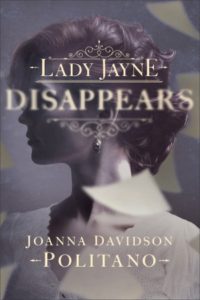Debut novelist Joanna Davidson Politano’s engaging Victorian mystery, Lady Jayne Disappears (Revell), will delight readers with its highly original plot, lush setting, vibrant characters, and reluctant romance. In this Q&A, the author shares how her Christian faith impacted the story, the process of creating the novel’s setting, and the most intriguing thing she learned during her research…
Tell us a little about Lady Jayne Disappears.
 This book is the result of asking, “What if an overlooked girl happened to secretly write her family into novels and publish them under a pen name?” Aurelie Harcourt has always created stories, and it’s the way she handles life in a home where she does not belong. She is writing the story of her mother, Lady Jayne, and the family that knew her before she disappeared. Aurelie begins digging into secrets and long-ago love stories to understand the people around her, but more than that, to discover what happened to the mother she’s never met.
This book is the result of asking, “What if an overlooked girl happened to secretly write her family into novels and publish them under a pen name?” Aurelie Harcourt has always created stories, and it’s the way she handles life in a home where she does not belong. She is writing the story of her mother, Lady Jayne, and the family that knew her before she disappeared. Aurelie begins digging into secrets and long-ago love stories to understand the people around her, but more than that, to discover what happened to the mother she’s never met.
Why did you decide to write about serial fiction? Why do you think it had such a great appeal?
Serial fiction resembles those addictive television shows we all anxiously await each week and then discuss passionately with friends. We become attached to characters and eagerly follow their struggles and victories to a grand conclusion, and working-class Victorians felt the same way about their serialized novels. Writing about serial fiction allowed me to delve into a charmingly vintage world while also presenting attitudes and circumstances that resemble our modern world, making the story relatable and relevant to our modern faith walks.
How did you develop the setting of the story? Did you visit a mansion that inspired you?
Big old houses are like characters to me. Each has a distinct personality and backstory just waiting for someone to unravel and understand. I’ve toured, stayed in, and climbed among the ruins of old houses throughout Great Britain, and many of my story ideas come from some unique aspect of a house I saw. I’m deeply fascinated with the people who have resided in these places, and their stories are so full of shadows and interesting corners with dark hallways just beyond. Lynhurst is based on a few different country houses I saw, but most of the layout and character are taken from Tyntesfield in Somerset. It’s a lovely old house with a wealth of stories.
What was the most interesting thing you learned while doing research for this book?
Debtor’s prison fascinates me. Charles Dickens spent time there when his father was a debtor, and his experiences made it into several of his books. It’s such an odd system, jailing people and keeping them from working until they can pay a debt, and my heart just ached for some of the individual stories I read of debtors. The place was run as a business, designed to scrape up anything of value the prisoners had or acquired from visiting relatives, and that still baffles me.
I’m also enchanted by the idea of pen names, which is an element of my heroine’s story. The Brontë sisters were famous for using them, and I loved the image of them revealing themselves to their publisher in person, as my heroine does in the opening of this novel. There’s also something so captivating to me about a seemingly nondescript person having a sort of secret super power.
Do you relate to Aurelie in any way? Did you have real people that inspired your characters?
 Oh yes! Aurelie’s writer heart mirrors my own in so many ways. It was easy to create her struggles through writing and everything that hinders it, because they are problems I’ve walked through countless times. Stories have been a part of my heart and a lens for viewing the world as long as I can remember, just like Aurelie. Her inability to overlook hurting people, her desire to help, and her love of beautiful words are all pages torn out of my own life story. The most similar aspect of her nature, however, is the daughter-heart that looks up to her father as larger than life, painting over all his flaws and embracing him and everything he values. My father is a storyteller and book lover like Aurelie’s, and although he does not struggle with the vices that gripped Aurelie’s father, he has cultivated a strong father-daughter bond with me. It was easy to wring her heart when it came to her father, because mine is just as dear to me as hers is to her.
Oh yes! Aurelie’s writer heart mirrors my own in so many ways. It was easy to create her struggles through writing and everything that hinders it, because they are problems I’ve walked through countless times. Stories have been a part of my heart and a lens for viewing the world as long as I can remember, just like Aurelie. Her inability to overlook hurting people, her desire to help, and her love of beautiful words are all pages torn out of my own life story. The most similar aspect of her nature, however, is the daughter-heart that looks up to her father as larger than life, painting over all his flaws and embracing him and everything he values. My father is a storyteller and book lover like Aurelie’s, and although he does not struggle with the vices that gripped Aurelie’s father, he has cultivated a strong father-daughter bond with me. It was easy to wring her heart when it came to her father, because mine is just as dear to me as hers is to her.
What lesson(s) do you hope readers will take away from reading your book?
There is one lesson my own heart has had a hard time learning over the years, and it’s the one Aurelie struggles with—if the world fits, you’re the wrong size. Just as Aurelie tries in vain to become a part of her wealthy socialite family, most of us have experienced the desire to belong somewhere, even if it was as unhealthy and broken as Aurelie’s family.
There’s a book I found in college that impacted me on this topic, and years later the truths from it remain with me. It convinced me that if we sometimes didn’t fit in to our earthly surroundings, that was all right. In fact, it was a sign we were doing things well. We all know this world is broken and sinful and messy, so why should we strive to fit into it? The more we resemble Christ, the more we feel at odds in this world. God designed us for a completely different environment that was ruined by sin, and now nothing will ever quite feel right until we’re reunited with God and saturated in his presence for eternity.
In what way would you say your faith is worked into the book?
As I wrote the book, I wrestled with how comfortable I should be in this world. Was it ok to be bothered by certain things, to be rejected by certain people? Should I seek to be content with what was in reach, or was a certain amount of discontent healthy? As my writer mind walked through this story with Aurelie, my Jesus-seeking spirit was working on realigning my motives and efforts with a larger focus than the here-and-now.
I began to appreciate and even embrace some of the countercultural parts of my personality and thinking as I reminded myself that Jesus was the most countercultural thinker ever! Jesus’s answers on success, wealth, priorities, and the value of certain people turned his listeners’ expectations upside down. The biggest one for me is that last one—the value of people. Why does the world automatically write off certain people? The elderly. The introverted. The homeless. Those who messed up in some way.
I’m infinitely content to be countercultural in this respect, and it’s been a passion of mine to reveal hidden value in the people the world so easily sidelines. I bring that into the book through Aurelie—not only does she see value in the debtors but she herself is written off by her own family and comes to understand how Christ values her.


